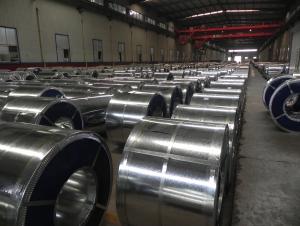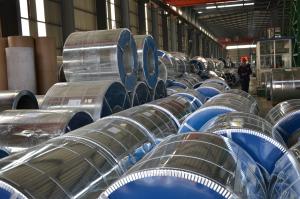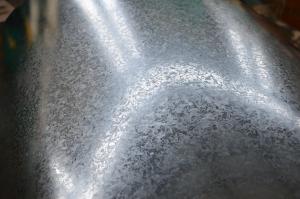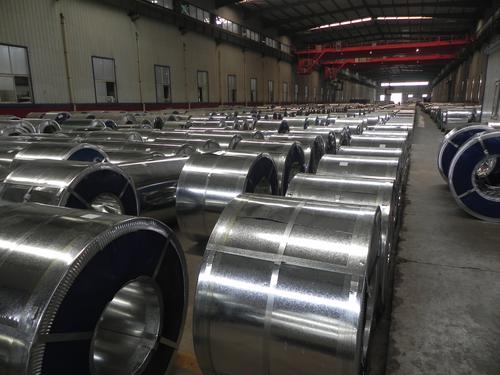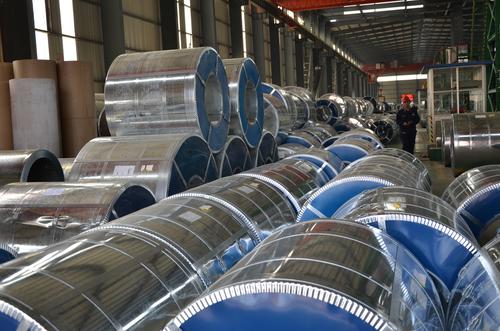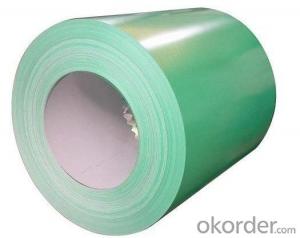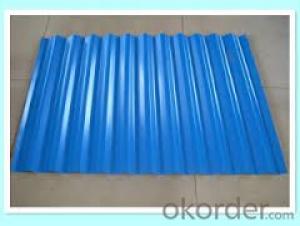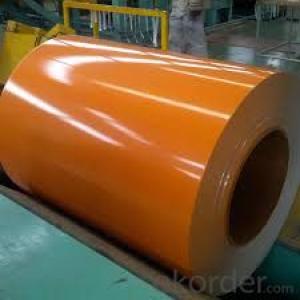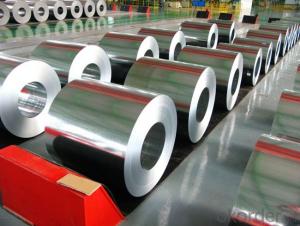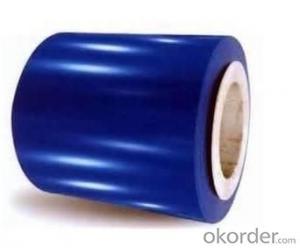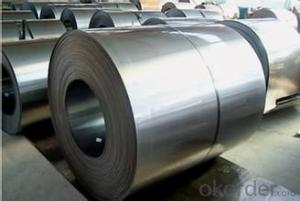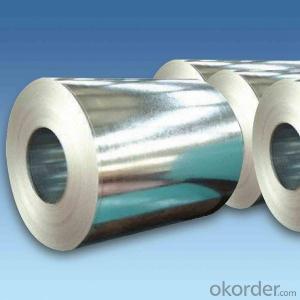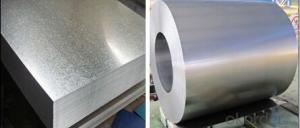galvanized steel coils
- Loading Port:
- China Main Port
- Payment Terms:
- TT OR LC
- Min Order Qty:
- -
- Supply Capability:
- -
OKorder Service Pledge
OKorder Financial Service
You Might Also Like
1) Quality Standard & Grade: JIS G3302, SGCC / ASTM 653M CQ/ EN10142 DX51D+Z
2) Thikness tolerance: +/-0.02mm Width tolerance:+/0.02mm
3) Zinc coating weight: 50g/m2
4) WEIGHT OF PER COIL: 3-5MT
5)Technology: cold rolled
6) Surface of Product: regular spangle / big spangle/ small spangle; Surface Treatment: chromated , non oiled, skin passed
7) Packing: export standard packing,packed with moisture resistant paper and metal
wrapping,securely tied for export,on metal skids7) Country of Origin :
SIZE:0.15*750
- Q: All the appliances in my kitchen are stainless steel, and I hate how they look becuase every time I wash them they are full of streaks. Is there a good cleaner made for stainless steel that won't leave streaks?
- Stainless Steel Appliance Cleaning Stainless steel kitchen appliances look best when they're clean and shiny. To clean tough stains and cooking grease, and give them a dazzling shine, try the same detergent you would use when washing the dishes. One formulated to cut grease works especially well.This also works well for general kitchen cleaning.Waterless hand soap also works great as a polish, simply rub on, and polish - no rinsing.=)
- Q: My boyfriend is a loyal follower of this guy called Dr. Steel.
- Dr. Steel is an extremely complex phenomenon, a bit of a metaphorical nesting doll. On the surface, Dr. Steel can appear to some as simply a method actor musician with an over-the-top gimmick. Just underneath that facade lies an enigma; he makes some people wonder if he's really serious, just trying to entertain, or completely barking mad. But underneath the second facade, Dr. Steel is really acclaimed comic-book writer and chaos magickian, Grant Morrison. Make no mistake, he really thinks he is Dr. Steel. He has taken method acting and ceremonial magick to the highest levels, and fully intends to take over (or make over) the world. What's more, in the three short years since handing over his comic-book authorship to a ghost writer, he has amassed tens of thousands of followers worldwide. I've done several polls among Dr. Steel fans, and the results show that for every one person who has officially signed up, there are ten more loyal followers who have not.
- Q: I want to experiment with making steel and want to especially make it stronger. And also I want to know if its possible to turn a meteorite into steel?
- To add to Alex's good answer... ASM Intl now has a book titled Steel Metallurgy for Non-Metallurgist. You can turn metallic meteorites into steel if you add the right amount of Fe and C. That won't make it the strongest but it is possible. I don't think you want the strongest exactly. In general and with swords in particular, you want to be pretty specific about exactly what physical properties you want. Strength and ductility typically vary inversely to each other, higher stength, lower ductility, or lower strength, higher ductility. The issue is related to the idea of a diamond sword. It would be nice and hard but it would probably shatter the first time you stuck anything with it. Swords need a combination of properties, hard so it holds a sharp edge, and tough so it does not fracture, strong so it can be light enough to swing.
- Q: How are steel coils used in the production of agricultural irrigation systems?
- Steel coils are used in the production of agricultural irrigation systems to create the pipes and tubing that transport water to crops. These coils are formed into various designs to meet specific irrigation needs, ensuring efficient and reliable water distribution for optimal crop growth.
- Q: What is the role of steel coils in the supply chain?
- The supply chain heavily relies on steel coils, especially in the manufacturing and construction sectors. These coils, typically made from hot-rolled steel, are essential raw materials for a wide range of products like automobiles, appliances, construction materials, and industrial goods. The journey of steel coils in the supply chain begins with the production of raw steel, which is then processed and shaped into coils at steel mills. These coils are then transported to different manufacturing facilities where they are transformed into finished products. Throughout this process, steel coils act as an intermediary product that is easy to transport, stack, and manipulate according to various manufacturing requirements. One major advantage of using steel coils in the supply chain is their strength and durability. Steel possesses high tensile strength, enabling it to withstand substantial loads and pressures. This makes steel coils perfect for applications that require sturdy materials like structural components in buildings, heavy machinery, and vehicles. Furthermore, steel coils offer high customization, allowing manufacturers to tailor their dimensions and specifications to meet specific needs. This flexibility ensures the efficient delivery of steel coils that align with the requirements of diverse industries and projects. In terms of logistics, steel coils are typically transported in large quantities using specialized equipment such as flatbed trucks, railcars, or even ships. Effective logistics planning is crucial to ensure timely delivery and minimize transportation costs. Additionally, proper storage and handling are vital to prevent damage to the coils during transit and storage. Overall, steel coils play a vital role in the supply chain as versatile raw materials that can be shaped and transformed into various end products. Their strength, durability, and flexibility make them an essential component in industries that rely on high-quality steel, ultimately contributing to the overall economic growth and development of numerous sectors.
- Q: How are steel coils coated for corrosion resistance?
- Steel coils are typically coated for corrosion resistance using various methods such as hot-dip galvanizing, electroplating, or applying a protective layer of paint or powder coating.
- Q: What are the different methods of embossing steel coils?
- There are numerous techniques for embossing steel coils, each possessing unique characteristics and applications. Some of the most prevalent techniques include: 1. Hot embossing: By heating the steel coil to a high temperature and pressing it between two engraved rollers, this method allows for intricate designs or textures to be imprinted onto the surface. The heat softens the steel, facilitating the desired pattern transfer. 2. Cold embossing: In contrast to hot embossing, cold embossing does not require heating the steel coil. Instead, it employs pressure and specifically designed dies or stamps to produce the desired pattern. Cold embossing is commonly used for simpler designs or when working with heat-sensitive materials. 3. Roller embossing: This technique involves using a series of rollers with engraved patterns to imprint the design onto the steel coil. The coil is passed through the rollers, and the applied pressure transfers the pattern onto the surface. Roller embossing is often utilized for larger-scale production, delivering consistent and uniform results. 4. Laser embossing: A modern method that employs laser technology to create patterns on steel coils. The laser beam selectively melts or vaporizes the metal, generating the desired design. Laser embossing offers high precision and flexibility, making it suitable for intricate and detailed patterns. 5. Press embossing: This technique utilizes a press machine equipped with custom-made dies to imprint the desired pattern onto the steel coil. The coil is positioned between the dies, and the press machine applies pressure, transferring the pattern onto the surface. Press embossing is commonly used for large-scale production, achieving high-speed and high-volume embossing. Ultimately, the choice of embossing method depends on various factors, including design complexity, production volume, material properties, and cost considerations. Each technique possesses advantages and limitations, necessitating careful selection by manufacturers based on their specific requirements.
- Q: What is the standard thickness of steel coils?
- The standard thickness of steel coils can vary depending on the specific application and industry. However, common thickness ranges for steel coils typically fall between 0.015 inches (0.38 mm) and 0.125 inches (3.17 mm).
- Q: Theirs this two handed chinese sword on amazon with a forged combat steel blade and i was wandering if it means combat steel in the same sense that tempered carbon steel can be used?
- as has been said before it is a mystery steel that could mean anything honestly I am guessing closer to 1045 than the already mentioned 1095.... or just stainless steel of some variety tldr we all are telling the truth do not buy it
- Q: How are steel coils used in the manufacturing of bridges?
- Steel coils are used in the manufacturing of bridges as they provide the raw material for creating structural components such as beams, girders, and columns. These coils are processed and shaped into the required sections, which are then assembled and welded together to form the bridge's framework. The strength and durability of steel make it an ideal material for constructing bridges that can withstand heavy loads and harsh environmental conditions.
Send your message to us
galvanized steel coils
- Loading Port:
- China Main Port
- Payment Terms:
- TT OR LC
- Min Order Qty:
- -
- Supply Capability:
- -
OKorder Service Pledge
OKorder Financial Service
Similar products
Hot products
Hot Searches
Related keywords
